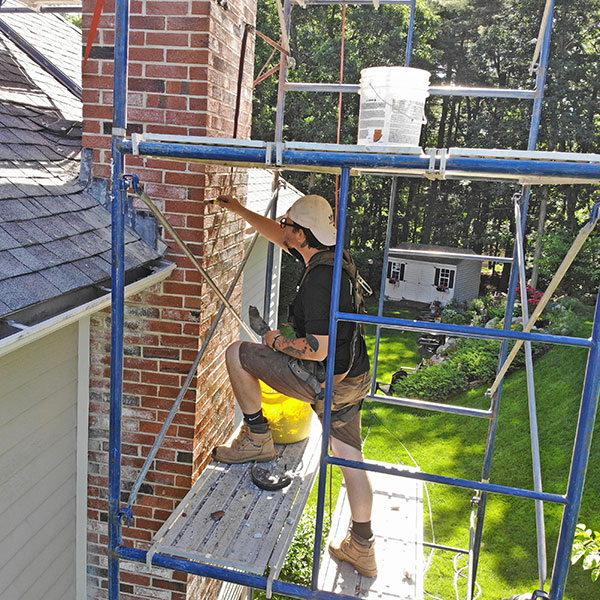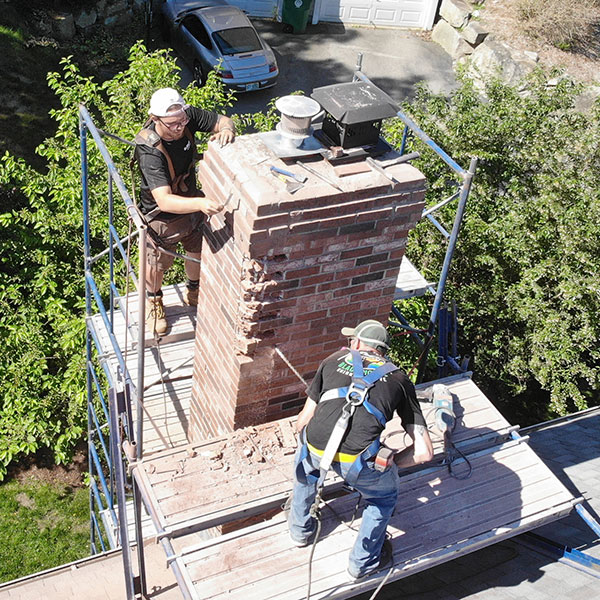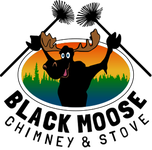Chimney cracks are problems that should not be ignored, and CSIA-certified chimney technicians have the know-how to provide the facts about the cracks. Black Moose Chimney & Stove, for instance, is the most trusted chimney sweep company in Southern New Hampshire. We will diagnose the cause of the cracks in your chimney and provide needed repairs, including a complete chimney rebuild if needed. The following are some basic facts about chimney cracks.
Water Leaks
Chimney problems in general are caused by water more than anything else. Water leaking into the masonry chimney system is serious. If repairs aren’t made quickly, water intrusion will cause the freezing and thawing cycles of winter to create destructive movement in the masonry, as the water expands and contracts. Cracks are among the ill effects of leaks. Spalling may occur, as well, which means that the brick face crumbles, flakes, and breaks off due to the effects of water intrusion. Effervescence or white staining on the chimney is also caused by water within the chimney system, and it can occur when the masonry contains water-soluble salts.
Improper Construction
There are certain aspects of chimney building that help to ensure a sound structure. If something in the construction is lacking, the result could be a cracked chimney. A common construction error is a failure to leave a thermal expansion gap between the clay flue liner and the sides of the chimney masonry.
The surrounding brick will crack after repeated use of the heating appliance, as the flue expands and contracts.
A Foundation Problem
The specifically-designed footing must be part of the construction of a masonry chimney. In addition to the usual foundation, the footing is needed for chimneys because they are extremely heavy. If the chimney footing and/or the foundation are not secured properly, the chimney may lean and cracks may appear.
 Mechanical Damage
Mechanical Damage
Various circumstances can stress a chimney to the point that cracks develop. A chimney-mounted antenna could cause chimney cracks. Nearby site blasting or an actual earthquake can also cause mechanical damage that results in chimney cracks.
If there are cracks in your chimney, it is important not to use the venting system until masonry repairs have been made.
The potential risks of using a cracked chimney include the following:
- Toxic gases could leak into your home. This includes deadly carbon monoxide, which is known as the “Silent Killer.” Carbon monoxide is tasteless, odorless, colorless, and symptomless. Unless there is an operational carbon monoxide detector in a home where exposure to the deadly gas is occurring, occupants often don’t survive.
- There is an increased risk of a house fire because if the chimney is split, the sparks could get to combustible parts of the home.
- When masonry chimneys begin to lean or crack, there is a very real risk of a sudden catastrophic collapse of the entire chimney structure. People could be injured and structural damage could be extensive.
- At the very least, a cracked chimney could adversely affect the operation of the chimney. When fumes don’t rise up and out of the chimney, carbon monoxide exposure can occur.
Questions? Ready for an Appointment? Contact Us Today!
We are South-Central New Hampshire’s #1 choice for chimney, fireplace & masonry services. Our team is National Chimney Sweep Guild (CCP/NCSG) certified and well-trained in current industry standards and procedures. We are ready to assist with inspections, repairs and installations for chimneys, fireplaces, wood and pellet stoves and more.
Contact Form
"*" indicates required fields



